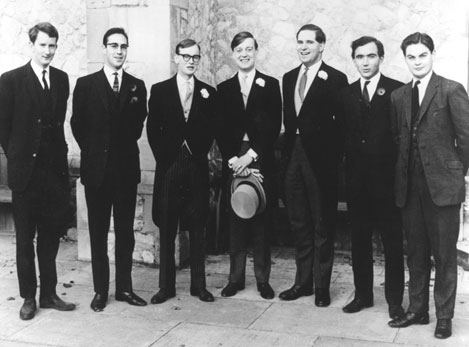Cambridge Mafia
The slightly pejorative term used to identify the emergence of a very considerable crop of Conservative politicians in the 1980s and 1990s, who were at Cambridge at roughly the same time. Many of them had held the chairmanship of the Cambridge University Conservative Association and by virtue of their combined College and Conservative vote others achieved office in the Cambridge Union Society. Some made it to the top in both organisations. Others took the part of “Napoleon Boot”, the political columnist on Varsity, the University newspaper. It is sometimes observed that few of them apart from Leon Brittan attained great academic distinction, but the Upper Seconds which many attained were by no means easy to obtain. The career degree was then a lower second.
Although most of the leaders of the Conservative party since the Second World War have been drawn from Oxford and that university has traditionally been held to have closer links with the Conservative party, the Cambridge mafia had been preceded by a number of Cambridge graduates in the 1950s who went on to high office, amongst them Geoffrey Howe, Douglas Hurd, John Biffen,David Howell, John Nott and Christopher Tugendhat.
Cambridge generations overlap, but those who would identify themselves as part of the group would include those who held the chairmanship of the Association between the Michaelmas Term 1959 and Michaelmas Term 1963, almost all of whom stayed close friends.
They were:
- Michaelmas 1959: Peter Lloyd, later MP and Minister
- Lent 1960: Leon Brittan, later MP and Cabinet Minister
- Easter 1960: Peter Viggers, later MP and Minister
- Michaelmas 1960: Norman Fowler, later MP and cabinet Minister
- Lent 1961: Peter Temple-Morris, later MP
- Easter 1961: John Selwyn Gummer, later MP, Party Chairman and Cabinet Minister
- Michaelmas 1961: Ken Clarke, later MP and Cabinet Minister
- Lent 1962: Hugh Dykes, later MP
- Easter 1962: David Glass
- Michaelmas 1962: John Toulmin, later a Judge
- Lent 1963: John Maskell
- Easter 1963: Norman Lamont, later MP and Cabinet Minister
- Michaelmas 1963: Peter Fullerton
Although Michael Howard held office in CUCA, he never became its chairman and briefly broke with the party over Clarke’s invitation to Sir Oswald Mosley to speak in Cambridge. He subsequently defeated Clarke for the Presidency of the Union, although Clarke later became President himself. Peter Lilley is often listed, but he was not particularly active in the Association, serving only as a College Secretary.
All were of relatively modest social background, educated at grammarschool or direct grant school (Lamont, who went to Loreto was an exception). In his memoirs Norman Fowler records that during his National Service, although he became a commissioned officer, it was in an ordinary county regiment (Essex) rather than the fashionable Guards or cavalry regiments favoured by young men from elite social backgrounds (as National Service came to an end in 1960, most members of the "Cambridge Mafia" just missed having to serve).
Lamont accurately characterised the group as the Tory modernisers of their day, and Gummer recalled that the CUCA magazine was re-launched as New Radical, edited by John Barnes. Others associated with the mafia include Colin Renfrew, later Lord Renfrew and Master of Jesus College, Cambridge. They were meritocratic in outlook and in general believed strongly in the welfare society rather than the welfare state. They tended to be pro-European, on the left in regard to decolonisation, but in most cases were both socially liberal and believers in the market. Many went on to join the Coningsby Club and the Bow Group
They were followed by a number of younger graduates like David Eady (now a judge), Clive Trebilcock (later an ecomonic historian) Allan Bradley, Howell Hughes and Adrian Vinson, who remained active in the party, at least for a while, but who never became MPs.
Although over subsequent decades a number of Cambridge graduates became MPs, none of them seem to have been so closely associated. They include Spencer Batiste, Howard Flight, Roger Evans, David Mellor, Tim Eggar, David Prior, Andrew Mitchell, David Lidington, Greg Hands and Archie Norman.
The photograph, reproduced in biographies of Clarke and Howard, shows Gummer as best man, and the ushers at Clarke's wedding. From left to right, Fullerton, Howard, Gummer, Clarke, Brittan, Christopher Mason (who became a Liberal Democrat) and Lamont. Wikipedia is in error in suggesting that Fowler is on the photograph, although like a number of others he was at the wedding.

It should not be assumed that these men all operated as a cohesive unit throughout their careers, although it is fair to say that whatever their political differences and rivalries, they remained friends and were often to be found at celebratory gatherings of a personal nature.
Howard was the only member of the group to become party leader, and none became Prime Minister. Two served as Chancellors of the Exchequer.
By the time the Conservatives returned to government in May 2010, after thirteen years in opposition, Clarke was the only member of the group who remained in the House of Commons. First a member of the government in 1972, when he was a government whip, he returned to office as Lord Chancellor and Minister of Justice, one of the few men to have held office in four separate decades.